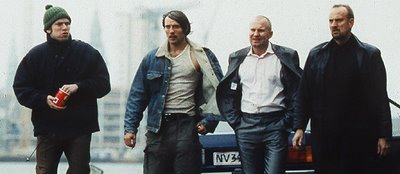 Flickering Lights (Blinkende lygter), directed by Anders Thomas Jensen 2000.
Flickering Lights (Blinkende lygter), directed by Anders Thomas Jensen 2000.I'm beginning to think that the Danes are starting to develop a monopoly on action/comedy films that are character pieces rather than special effects vehicles and slick killing sprees. The Pusher Trilogy is a prime example of this type of work, but I feel it is safe to say that no one does it quite like Anders Thomas Jensen.
I first had the pleasure of being exposed to Jensen's work while at the Sydney International Film Festival. By far my favorite film of the festival, Adam's Apples was a breath of fresh air (you can read my review of that film on this site as well). The type of thing you hadn't even realized you were missing so badly until you are confronted with it.
So when my step-mother asked me if there was anything I had in mind for my birthday, the two Jensen films available on Amazon.com were the first thing I mentioned. Several weeks later the long-awaited package arrived. Inside waiting for my viewing pleasure was Flickering Lights and The Green Butchers. I decided to start with the earlier film and work my way forward and so in went Flickering Lights.
It's always dangerous going into a film with really high expectations, but thankfully Jensen did not disappoint. Though I have only seen two of his films he is quickly sky rocketing to the top of the talent pool in my opinion. His directing is spot on, and his writing perhaps outshines his directorial talent.
Flickering Lights follows the adventures of four men, low level thieves and thugs, who just can't seem to get out from under the thumb of the local big wig crime boss. While committing a robbery for the crime boss the boys take a peek inside the suitcase they are to steal, revealing millions in cash. Seeing their opportunity to escape they decide to make a run for it.
What appears to shaping up to be a action/adventure road movie turns into something else entirely when their van breaks down in the middle of the woods. Shacking up in a cottage, they have to learn to blend in with the locals until they are able to leave. The only problem is each one of them slowly realizes they don't want to leave. They'd like to stay, open up a restaurant, and start a new life.
At its heart the film is about the sometimes funny, sometimes touching relationship between four men that has developed since childhood. Coming from severely dysfunctional families, they found each other and formed a dsyfunctional family of their own.
It's about facing personal demons, realizing each person has their own quirks, that some may see as character faults, but others see as endearing. It's a feel good movie that comes in the most ridiculously anti-feel good movie packaging.Cows may be shot, people's faces may smashed in repeatedly with shattered beer mugs, people will be murdered, but through it all you might be surprised to find yourself being as moved by the movie as Stefan is by the book of poetry, Flickering Lanterns, that he reads to pass the time.
